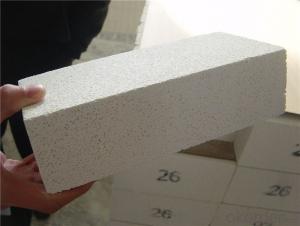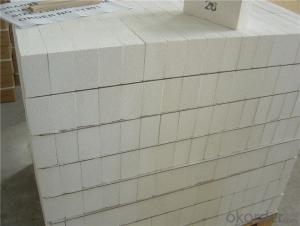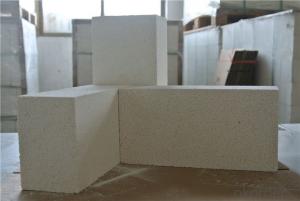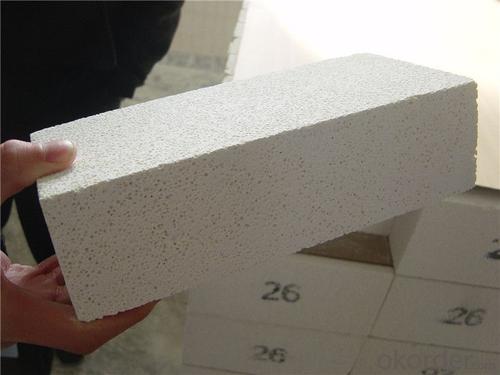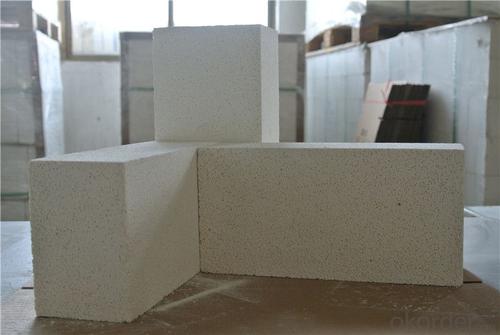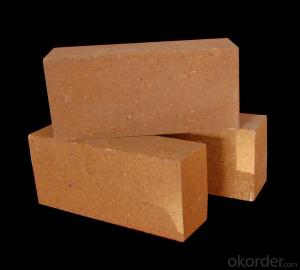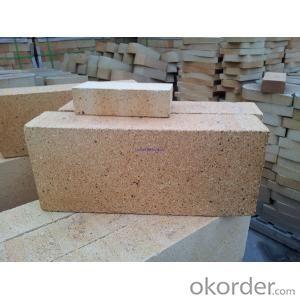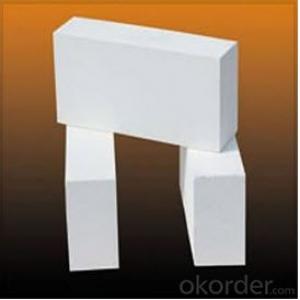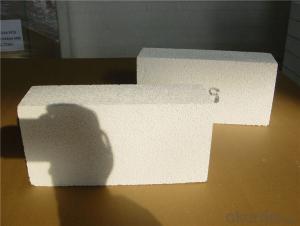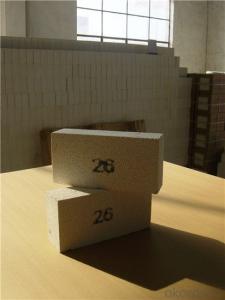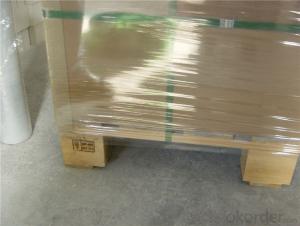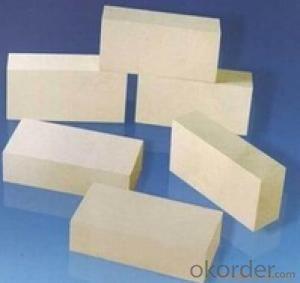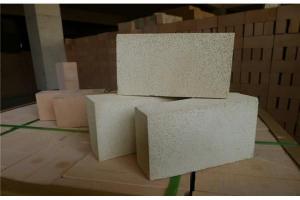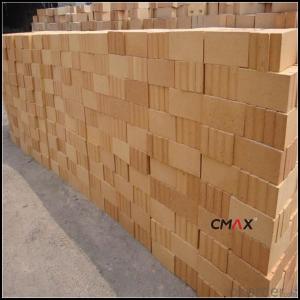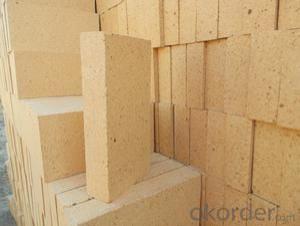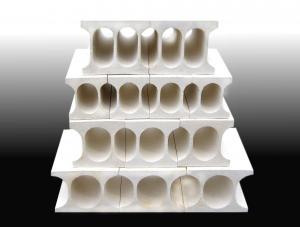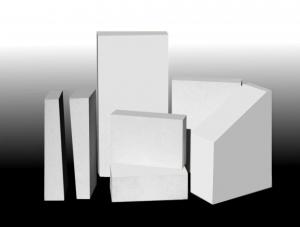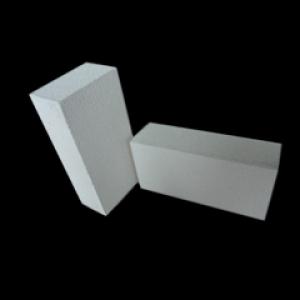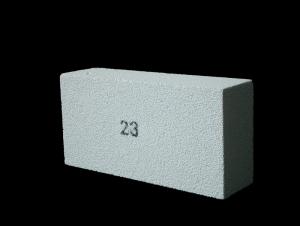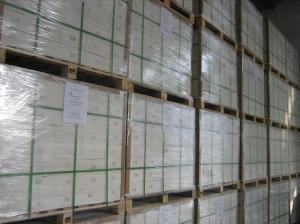Insulating Fire Brick - Lightweight Fire Clay Insulating Fire Brick
- Loading Port:
- Tianjin
- Payment Terms:
- TT OR LC
- Min Order Qty:
- 30 m.t.
- Supply Capability:
- 10000 m.t./month
OKorder Service Pledge
OKorder Financial Service
You Might Also Like
CNBM conforms strictly to the requirements of ISO 9000 quality control system during the production. MSDS is also available if you want. The thermal insulation fire clay brick meet with the requirements of ASTM & JIS standards. So pls stay cool with our quality.
Insulating Fire Brick Technical index
Product No. | IFB70 | IFB60 | IFB50 | IFB40 |
Al2O3 | 68%-72% | 58%-62% | 48%-52% | 38%-40% |
Refractoriness (°C ) | ≥1790 | ≥1790 | ≥1790 | ≥1790 |
Bulk density (g/cm3) | 2.50-2.60 | 2.35-2.45 | 2.20-2.30 | 2.10-2.20 |
Apparent porosity (%) | 22 | 19-22 | 17-20 | 17-20 |
Cold Crushing strength (kg) | 480-510 | 450-480 | 430-450 | 390-430 |
Application
Insulating Fire Brick are used for the lining of converter, alternating current arc furnace, direct Current arc furnace and the ladle slag line, etc.
Equipment
1 unit of Ceramic Abrasive (SG Abrasive) pilot production line
2 units of Compact grain Abrasive pilot production lines
1 unit of high-end coated abrasives (abrasive cloth) production line
2 units of Boron Carbide production lines
3 large flexible crushing and sieving lines for grit production lines
2 units of 2000KVA furnaces for Boron Carbide fusion
6 units of 5000KVA-10000KVA dumping type electric arc furnaces for Brown Fused Alumina fusion
Company Advantage
(1)Long Insulating Fire Brick manufacture history: 25 years manufacturer
(2)Advanced equipment
(3)Diversification of production standards: ISO ANSI FEPA JIS ASTM
(4)Flexible payment: T/T L/C D/P D/A
(5)Professional marketing team and after-sale service
(6)Free sample
FAQs
Q1 |
What’s the transport method? |
A1 | FCL delivery goods with wooden pallet or wooden case by sea; If LCL delivery, must with wooden case; Sometimes need open top, flat rack or bulk cargo. |
Q2 |
What’s the required payment term? |
A2 | Generally 30% TT as the prepayment, 70% TT before delivery. If need, 100% Irrevocable Letter of Credit or negotiation. |
Q3 |
Which country are our products exported to? |
A3 | Apart from entire Chinese market, the US, Russia, Japan, Korea, Australia and some Southeast Asian Nations. |
- Q: Can insulating fire bricks be used in the construction of pottery kiln shelves?
- Yes, insulating fire bricks can be used in the construction of pottery kiln shelves. Insulating fire bricks are designed to withstand high temperatures and provide excellent insulation, making them an ideal material for kiln shelves. They can help maintain consistent heat distribution and prevent thermal shock, which is important for firing pottery. Additionally, insulating fire bricks are lightweight and easy to handle, making them a practical choice for constructing kiln shelves.
- Q: The insulation layer destroyed after use of cement paste and tiling
- Put on the insulating layer and paste it with cement.Some students worry about the insulation layer and the wall adhesive strength is not enough, do not worry about, now developers are building exterior insulation and then on top of the tiling. Because after finishing the insulation layer, the contractor should check the construction to do a pullout test, the purpose is to prevent the strength can not meet the requirements.
- Q: Can insulating fire bricks be used in refractory castings?
- Yes, insulating fire bricks can be used in refractory castings. These bricks are designed to have low thermal conductivity, making them suitable for applications where high insulation is required, such as in refractory castings. They provide excellent heat insulation and can withstand high temperatures, making them an ideal choice for various refractory applications.
- Q: Can insulating fire bricks be used in carbon black reactors?
- Yes, insulating fire bricks can be used in carbon black reactors. Insulating fire bricks are designed to withstand high temperatures and provide excellent thermal insulation. In carbon black reactors, which typically operate at very high temperatures, insulating fire bricks can help to reduce heat loss and improve energy efficiency. Additionally, the insulating properties of these bricks can help to maintain a more stable temperature within the reactor, which is crucial for the carbon black production process. Therefore, using insulating fire bricks in carbon black reactors can be a beneficial choice in terms of both thermal insulation and energy conservation.
- Q: Are insulating fire bricks resistant to oil or chemical spills?
- Insulating fire bricks lack resistance to oil or chemical spills in general. Their main purpose is to endure high temperatures and offer insulation in various settings, such as furnaces, kilns, and fireplaces. Despite their efficient handling of heat and thermal shock, these bricks are typically composed of materials like clay, alumina, or silica, which do not possess inherent resistance to oil or chemicals. In the event of exposure to oil or chemical spills, these bricks may absorb the substances, potentially resulting in degradation or diminished performance over time. Hence, if oil or chemical resistance is a crucial requirement, it is advisable to explore alternative materials explicitly designed for such applications.
- Q: Can insulating fire bricks be used in chimney liners?
- Yes, insulating fire bricks can be used in chimney liners. Insulating fire bricks are designed to withstand high temperatures and provide excellent insulation properties. They are commonly used in applications such as kilns, furnaces, and fireplaces where heat retention is important. When used as chimney liners, insulating fire bricks help to protect the chimney walls from the extreme heat generated by the fire, while also minimizing heat loss. This can improve the efficiency of the chimney and reduce the risk of damage to the surrounding structure. However, it is important to consult with a professional chimney technician or engineer to ensure that the specific type of insulating fire brick being used is suitable for the intended application and meets all relevant safety standards and building codes.
- Q: Are insulating fire bricks suitable for use in residential fireplaces?
- Insulating fire bricks can be suitable for use in residential fireplaces, depending on the specific requirements and preferences of the homeowner. Insulating fire bricks are designed to have a low thermal conductivity, which means they can effectively retain heat and prevent it from escaping the fireplace. This can result in a more efficient and effective heating of the room, as less heat is lost through the bricks. Additionally, insulating fire bricks are lightweight and easy to handle, making them a convenient option for homeowners who may want to install or replace bricks themselves. They are also durable and resistant to high temperatures, ensuring that they can withstand the intense heat produced by the fire. However, it is important to note that insulating fire bricks may not be the best choice for everyone. Traditional fire bricks are denser and have a higher thermal mass, which means they can absorb and radiate heat for a longer period of time. This can create a more consistent and long-lasting heat output, which some homeowners may prefer. Ultimately, the decision to use insulating fire bricks in a residential fireplace should be based on the specific needs and preferences of the homeowner. Consulting with a professional fireplace installer or seeking advice from a reputable supplier can help ensure that the chosen bricks are suitable for the intended use.
- Q: Can insulating fire bricks be used in glass furnaces?
- Yes, insulating fire bricks can be used in glass furnaces. Insulating fire bricks are designed to have low thermal conductivity, which makes them ideal for use in high-temperature environments like glass furnaces. These bricks help to reduce heat loss from the furnace, resulting in improved energy efficiency and reduced operating costs. They also provide better insulation and help to maintain consistent temperatures inside the furnace, which is crucial for glass production. Additionally, insulating fire bricks have good resistance to thermal shock and can withstand the extreme temperatures and rapid temperature changes that occur in glass furnaces. Overall, the use of insulating fire bricks in glass furnaces can contribute to better furnace performance, increased productivity, and energy savings.
- Q: What are the improvements and improvements during the trial production of insulating bricks?
- Insulation brick seven characteristics: insulation, heat insulation: effectively reduce energy consumption.Fire prevention: up to national standard or class A.Clean and environmental protection: no two pollution will be caused by air.
- Q: Can insulating fire bricks be used in metal smelting furnaces?
- Insulating fire bricks are indeed suitable for metal smelting furnaces. Specifically designed with low thermal conductivity, these bricks effectively retain heat and prevent heat loss from the furnace. This quality makes them perfect for maintaining high temperatures over long periods in metal smelting furnaces. Moreover, insulating fire bricks exhibit resistance to thermal shock, enabling them to endure the extreme conditions and sudden temperature fluctuations that occur during metal smelting processes. Additionally, their lightweight nature facilitates easy handling and installation within the furnace. In summary, insulating fire bricks are an excellent choice for enhancing energy efficiency and extending the lifespan of metal smelting furnaces.
Send your message to us
Insulating Fire Brick - Lightweight Fire Clay Insulating Fire Brick
- Loading Port:
- Tianjin
- Payment Terms:
- TT OR LC
- Min Order Qty:
- 30 m.t.
- Supply Capability:
- 10000 m.t./month
OKorder Service Pledge
OKorder Financial Service
Similar products
Hot products
Hot Searches
Related keywords
